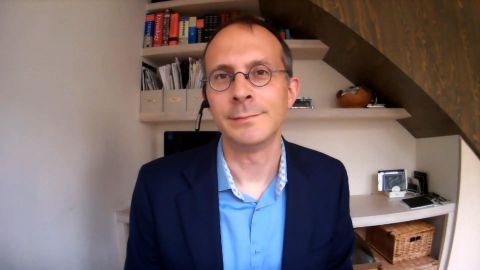Read Transcript EXPAND
CHRISTIANE AMANPOUR: I’m just wondering as an initial question, you know, you’re looking at it now, two months later. Are you shocked by how bad it’s got?
TIM HARFORD, ECONOMIST AND JOURNALIST: I am surprised at the fact that it seems that each country and even the United States, each individual state has had to relearn the same lessons. One of the things that shouldn’t have surprised me is how difficult we find it to learn from each other. We have to — it seems we have to learn the lessons ourselves the hard way rather than just saying, well, what did China do, what did Italy do and how can we do better.
AMANPOUR: So, in your latest column you’ve written basically that our disparate perceptions of risk are creating a social mine field. It could have been written for what we’re seeing in the various states in the United States. And I just want to ask you because on CNN, the anchor, Brianna Keilar, spoke to a state representative from Florida who basically told her Florida is doing just great, whereas by all, you know, factual evidence, it seems to be the latest epicenter. Let’s just put a little of what he said and we can discuss the thinking behind that.
BRIANNA KEILAR, CNN HOST: You think Florida is doing fine right now?
STATE REP. ANTHONY SABATINI (R-FL): Absolutely. I think the governor’s response has been on point and I think the metrics that matter the most, we’re doing very well in. And if you’re counting cases, you’re going to scare people.
AMANPOUR: So, how do you analyze that, and not just as a politician speaking but the effect that that kind of thinking has on the very real public health piece of this.
HARFORD: Yes. I mean, naturally anybody who’s involved in politics is going to want to make their own party out to be doing a great job and the opposing party to be full of scoundrels. So, it’s hard to take any politician too seriously. But what we — the difficulty with interpreting the evidence is that there’s always a delay. We miss a certain number of cases and then it takes a while for cases to turn into hospitalizations, then takes a while for hospitalizations to turn into deaths. And so, we have to be willing to think ahead, two weeks, four weeks, six weeks to figure out how bad things might get. And it turns out that the — quite apart from the politically motivated reasoning, that the psychological evidence seems to show we’re really difficult to gaining — I mean, we find it really difficult to gain these things out. And we respond eviscerate what’s happening in terms of us right now to the images we’re being shown, to the stories we’re being told. Just to follow the maps of an exponential curve, for example, we consistently underestimate just how bad things will get all too soon.
About This Episode EXPAND
Comedian Hannah Gadsby discusses her latest stand-up special “Douglas.” Economist and journalist Tim Harford explains why some governments fail to prepare for catastrophes. Randi Weingarten, president of the American Federation of Teachers, joins Hari Sreenivasan to discuss the steps towards reopening schools in the U.S.
LEARN MORE


